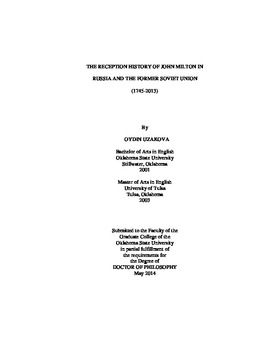| dc.contributor.advisor | Jones, Edward | |
| dc.contributor.author | Uzakova, Oydin | |
| dc.date.accessioned | 2015-06-17T20:08:19Z | |
| dc.date.available | 2015-06-17T20:08:19Z | |
| dc.date.issued | 2014-05 | |
| dc.identifier.uri | https://hdl.handle.net/11244/15155 | |
| dc.description.abstract | This study divides the reception history of John Milton in Russia and the former Soviet Union into three periods: pre-Soviet, Soviet, and post-Soviet. The rationale for this division is rooted in the clear ideological ethos that marks each period, shaping Milton's image into a desirable propagandistic mold. Milton's reputation in Russia has undergone a cyclical development, returning to the point where it essentially began, and paralleling the course of Russian religious, social, and intellectual history. The reception has largely depended on the perception of Milton's epic Paradise Lost, in particular on the interpretation of Milton's literary creation of Satan. As Milton's epic has been deemed successful over time, so has the reputation of its creator followed suit. The first notices of Milton in Russia date from the manuscript translation of Paradise Lost in 1745 by Baron A. S. Stroganov. Eighteenth- and nineteenth-century Russian society adhered to the tenets of the Russian Orthodox Church; hence appraisals of the poem predictably focus on Milton's notions of Christian doctrine, especially those parts of Paradise Lost which reflect orthodox positions. The gradual secularization of Russian society after the Enlightenment brings with it the formation of a new, secular setting for Milton's Christian epic, which advances further with the establishment of Marxist-Leninist ideology as a result of the October Revolution of 1917. The official atheism of the Soviet period propagates the Marxist exegesis of Milton's epic, shaping its author into a revolutionary free thinker who rebels against the old political system and asserts his right to liberty. With the collapse of the Soviet Union and the consequent decline of dialectical materialism and faith in Communism, there followed the revival of Christian religion, and with it the return to examination of Christian contexts in Milton's work. | |
| dc.format | application/pdf | |
| dc.language | en_US | |
| dc.rights | Copyright is held by the author who has granted the Oklahoma State University Library the non-exclusive right to share this material in its institutional repository. Contact Digital Library Services at lib-dls@okstate.edu or 405-744-9161 for the permission policy on the use, reproduction or distribution of this material. | |
| dc.title | Reception history of John Milton in Russia and the former Soviet Union (1745-2013) | |
| dc.contributor.committeeMember | Walker, Jeffrey | |
| dc.contributor.committeeMember | Wadoski, Andrew | |
| dc.contributor.committeeMember | Recker, Doren | |
| osu.filename | Uzakova_okstate_0664D_13292.pdf | |
| osu.accesstype | Open Access | |
| dc.type.genre | Dissertation | |
| dc.type.material | Text | |
| dc.subject.keywords | john milton | |
| dc.subject.keywords | reception history | |
| dc.subject.keywords | russia | |
| dc.subject.keywords | soviet union | |
| thesis.degree.discipline | English | |
| thesis.degree.grantor | Oklahoma State University | |
